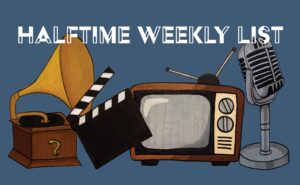Upon opening up TikTok, I navigate towards the For You page, per usual. Immediately, I see an AI-generated video of President Trump talking about med bed spa conspiracies. Over the next few scrolls, I encounter an Alix Earle “Get Ready With Me,” another rendition of the 6-7 meme, a Labubu unboxing, and a Subway Surfers montage with a Reddit story playing in the background. Towards the end of my scrolling, I reach an edit of popular “manosphere” creator, Myron of the Fresh and Fit podcast, claiming that “if women did not have a v****a then men would not talk to them.”
The combination of unpredictable content and the addictive nature of social media makes it an inherently dangerous ecosystem, embedding explosive content like Myron’s statement amongst a range of innocuous videos. These apps lead users down rabbit holes of extremist views, causing them to internalize these beliefs and act out on their newfound passion or anger towards institutions, people or policies. Younger demographics are more susceptible to the harmful effects of the algorithm and constantly consuming this “brainrot” can heavily impact their world views. This isn’t simply a hypothetical scenario, but one that has caused so much concern that it has recently been played out on our screens as a warning.
Netflix’s 2025 Emmy award-winning TV series Adolescence follows the story of a 13-year-old boy named Jamie Miller, who is accused of murdering his female classmate Katie. While being questioned by the police, Jamie adamantly denies his involvement until he is shown video proof of him meeting Katie in a parking lot and brutally stabbing her to death. Through the investigation, we learn that Katie had rejected Jamie’s romantic advances and that Jamie was consuming content from male creators who preach pseudo-self-help by blaming all of men’s troubles on women.
Even though the start of the show leads viewers to expect a classic whodunit story, by the end of Episode One it becomes clear that the show is far more concerned with the motivations behind such a grizzly crime from such a young perpetrator. The show explores themes of radicalization, isolation, and the development of toxic masculinity. Plot development in earlier episodes leaves room in the rest of the show to explore how Jamie internalized this online content and shifted his views to ultimately commit murder.
Adolescence Executive Producer Stephen Graham, who also plays Jamie’s father, said that the inspiration for the show came after the deadly stabbing of a young girl by a young boy in the UK in 2021. In an interview with Netflix he said that the show aims to have audiences question “what is happening to our young men these days, and what are the pressures they face from their peers, from the internet, and from social media?.” He added that the show, “also encourages everyone to grapple with what’s happening to our society and with future generations of young people who are served information in an entirely different way than prior ones.”
Conversation surrounding male loneliness first began in 2021 after the Survey Center on American life released data citing that only 27% of men reported having six or more close friends and 15% reported having no close friends. That same year, the Survey Center on American life also found that only 48% of men reported feeling satisfied by their existing friendships.
These feelings of isolation have developed into a collection of online forums, blogs, and social media pages known as the “manosphere”. Creators in the manosphere have amassed thousands of followers, many of them young men, indoctrinating them with their misogynistic rhetoric and opinions. These include depicting women as manipulative gold-diggers and encouraging men to indulge in expensive purchases and body-building in order to appear more masculine or desirable. The manosphere’s messaging has no issue reaching larger demographics of people, simply due to the fact that social media use is ubiquitous among most youth.
Gen Z spends the most time, of any generation, on social media, an average of four hours per day. While there are many positive impacts of social media—connection and community are ostensibly easier to find than ever—there are also core drawbacks, particularly the prevalence and accessibility of extremism found on these outlets.
In the second episode of Adolescence, we see a conversation between Detective Frank, who is investigating the murder, and his son, who attends the same school as Jamie. During this conversation, his son tells him about popular male influencer Andrew Tate, whose content many students seem to be discussing and sharing on their own social media accounts.
Tate rose to fame in 2022 after various clips of his podcast Tate Speech went viral. What started off as seemingly harmless life advice slowly turned into encouraging young men to become a “top G,” (regularly going to the gym), showing less vulnerability, and asserting dominance in their relationships and professional lives to prove their worth.
Apart from acting as a life-coach for young men, Tate has also expressed extremist views on heterosexual relationship dynamics and how he believes a woman should act. This includes believing that women become a man’s property through marriage and stating that he would never “let” his girlfriend go out of the house. One of his most popular clips involves him stating that “more men should walk around their house with swords” as a way to gain “respect” from their female partners and make their minds “naturally align with the world.”
Tate has also repeatedly made violent comments towards women, including a clip in which he depicts his response to a woman accusing him of cheating, saying :“it’s [time to] bang out the machete, boom in her face and grips her by the neck. [Say] shut up bitch.” In May, Tate was faced with charges of rape, human trafficking and assault, underlining how misogynistic rhetoric can turn into violence.
Though Tate was not the first to spread this rhetoric, he was one of the first to bleed into mainstream media. Going viral, combined with appearances speaking with the biggest online male streamers including Adin Ross, turned Tate into a mainstream figure.
In Adolescence, we never see the exact content Jamie was watching, but by mentioning a real-world figure, perhaps the producers sought for this show to be an unsettlingly realistic crime drama—one that shows us what could happen (and what has already happened) if society does not start paying attention to the media youth are consuming. This show is a wake up call.
After Andrew Tate and manosphere content are brought to the attention of the detectives, they are able to start putting pieces together and uncover the rabbit hole Jamie went through that radically changed his mindset and pushed him to commit murder.
In 2024, the Equimundo: Center for Masculinities and Social Justice released a report titled “State of American Men 2023” regarding the “online lives” of men ages 18 to 23. Through studying six”online male-majority spaces” they found that 48% of men felt as though their online life was “more interesting” than their offline counterparts. Similarly, the survey also discovered that two-thirds of males who frequented online gaming spaces “felt more like their ‘true selves.’”
This survey also found that 40% of men reported that they trusted the content of popular manosphere creators such as Andrew Tate and Jordan Peterson. A 2024 survey from Dublin City University also found that content promoting Tate’s perspectives across platforms such as YouTube, TikTok and Instagram, has been viewed nearly 11.6 billion times.
Manosphere creators prey on the insecurities of young men and weaponize their feelings to turn them against women. Instead of promoting healthy coping mechanisms, these podcasts often glorify misogyny. They frame women as hypergamous and the reason for which they are “involuntary celibates”, and accuse them of purposely withholding sex and only being intimate with men who are of “high value.”
What starts off as a way to escape from their own thoughts becomes a gateway into a world of toxic masculinity and a spiral of distorted self-validation. Falling into the addictiveness of doomscrolling, literally engineered by social media companies to trap us in their platforms, creates a warped sense of community and brotherhood, leaving the viewer feeling more isolated and disconnected from society. Instead of finding friendship or genuine advice, they end up in a cycle of competition against each other, self-hatred, and self-doubt, all channeling towards violence against women.
Indeed, the issue with this rhetoric lies not only in the way that it affects male viewers, but in how it threatens women and others around these viewers. As seen in Adolescence, these insecurities often come from a place of feeling undesired by women. To some extent, the blame should be directed to the media that fuels these insecurities and validates problematic ways of acting on them. But the influence of social media does not excuse individual men from acting out towards women, especially when violence is involved. At some point, chronically online individuals must escape their screens and realize that there are other ways to heal beyond hatred and aggression, which should never be an option.
For example, Micheal McKenzie was a young man who got sucked in manosphere content after feelings of rejection and inadequacy—he had never been in a relationship and felt undesired by women. He formed a nihilistic view on life, believing the widely circulated idea that 80% of women are attracted to only 20% of men and that dating depends solely on looks and status. Even when he started to make progress in his dating life, McKenzie acknowledged that he viewed women as “achievements to check off on a box that made [him] feel masculine.” Eventually, McKenize sought ways to break out of this cycle and started putting his energy into volunteer, community service and learning skills such as construction to help himself build confidence outside of his physical appearance.
Stories like McKenzie’s serve as a reminder that it is possible for men to break away from these toxic mindsets, and find value in themselves outside what these gurus deem important.
Following and consuming this content only perpetuates anger and resentment. It is up to individuals to decide if they want to continue this cycle or find healthy and productive ways to release these feelings. Masking emotions and taking them out on a punching bag is not going to suddenly make you attractive to women. Having emotional maturity and being able to discuss your feelings or express them in healthy ways is. It’s important to recognize that due to societal expectations, men are often encouraged to avoid public displays of emotion, but being able to take the first step and open yourself up to being vulnerable can make a difference for yourself and those around you.
Adolescence brings to light how easy it is to blur the lines between digital and physical reality, creating a false sense of values and understanding of what really matters. It draws attention to the male loneliness and insecurity epidemic, showing how it can manifest very early, severely, and unexpectedly within young men. Unless we come together to increase access to resources alternative to the manosphere, the Jamies of the world will never get the help they need.






